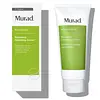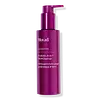What's inside
What's inside
 Key Ingredients
Key Ingredients

 Benefits
Benefits

 Concerns
Concerns

 Ingredients Side-by-side
Ingredients Side-by-side

Water
Skin ConditioningSodium Cocoyl Isethionate
CleansingGlyceryl Stearate Se
EmulsifyingGlycerin
HumectantStearic Acid
CleansingCetyl Alcohol
EmollientPrunus Armeniaca Kernel Oil
MaskingPalmitoyl Tripeptide-5
Skin ConditioningButyrospermum Parkii Butter Extract
Skin ConditioningCocamidopropyl Dimethylamine
EmulsifyingLactic Acid
BufferingHydrated Silica
AbrasivePhenylethyl Resorcinol
AntioxidantHydrolyzed Corn Starch
HumectantSodium Hydroxide
BufferingUrea
BufferingYeast Amino Acids
HumectantTrehalose
HumectantInositol
HumectantTaurine
BufferingBetaine
HumectantBorago Officinalis Seed Oil
EmollientOenothera Biennis Seed Extract
Skin ConditioningSerenoa Serrulata Fruit Extract
Skin ConditioningPanthenol
Skin ConditioningChondrus Crispus Extract
Skin ConditioningChamomilla Recutita Flower Extract
MaskingSodium Hyaluronate
HumectantImperata Cylindrica Root Extract
Skin ConditioningBenzophenone-4
UV AbsorberButylene Glycol
HumectantPEG-8
HumectantBenzalkonium Chloride
AntimicrobialCarbomer
Emulsion StabilisingXanthan Gum
EmulsifyingPhenoxyethanol
PreservativeCaprylyl Glycol
EmollientChlorphenesin
AntimicrobialParfum
MaskingWater, Sodium Cocoyl Isethionate, Glyceryl Stearate Se, Glycerin, Stearic Acid, Cetyl Alcohol, Prunus Armeniaca Kernel Oil, Palmitoyl Tripeptide-5, Butyrospermum Parkii Butter Extract, Cocamidopropyl Dimethylamine, Lactic Acid, Hydrated Silica, Phenylethyl Resorcinol, Hydrolyzed Corn Starch, Sodium Hydroxide, Urea, Yeast Amino Acids, Trehalose, Inositol, Taurine, Betaine, Borago Officinalis Seed Oil, Oenothera Biennis Seed Extract, Serenoa Serrulata Fruit Extract, Panthenol, Chondrus Crispus Extract, Chamomilla Recutita Flower Extract, Sodium Hyaluronate, Imperata Cylindrica Root Extract, Benzophenone-4, Butylene Glycol, PEG-8, Benzalkonium Chloride, Carbomer, Xanthan Gum, Phenoxyethanol, Caprylyl Glycol, Chlorphenesin, Parfum
Water
Skin ConditioningGlycerin
HumectantDecyl Glucoside
CleansingC13-16 Isoparaffin
SolventHexylene Glycol
EmulsifyingPropanediol
SolventHydroxyethyl Acrylate/Sodium Acryloyldimethyl Taurate Copolymer
Emulsion StabilisingLactobacillus
Skin ConditioningAlpha-Glucan Oligosaccharide
CleansingPolymnia Sonchifolia Root Juice
Skin ConditioningXylitol
HumectantXylitylglucoside
HumectantAnhydroxylitol
HumectantSodium Hyaluronate
HumectantSodium Surfactin
CleansingSqualane
EmollientUrea
BufferingYeast Amino Acids
HumectantTrehalose
HumectantInositol
HumectantTaurine
BufferingBetaine
HumectantIsohexadecane
EmollientCaprylhydroxamic Acid
Maltodextrin
Absorbent1,2-Hexanediol
Skin ConditioningPolysorbate 80
EmulsifyingAcrylamide/Sodium Acryloyldimethyltaurate Copolymer
Emulsion StabilisingCitric Acid
BufferingDisodium EDTA
Water, Glycerin, Decyl Glucoside, C13-16 Isoparaffin, Hexylene Glycol, Propanediol, Hydroxyethyl Acrylate/Sodium Acryloyldimethyl Taurate Copolymer, Lactobacillus, Alpha-Glucan Oligosaccharide, Polymnia Sonchifolia Root Juice, Xylitol, Xylitylglucoside, Anhydroxylitol, Sodium Hyaluronate, Sodium Surfactin, Squalane, Urea, Yeast Amino Acids, Trehalose, Inositol, Taurine, Betaine, Isohexadecane, Caprylhydroxamic Acid, Maltodextrin, 1,2-Hexanediol, Polysorbate 80, Acrylamide/Sodium Acryloyldimethyltaurate Copolymer, Citric Acid, Disodium EDTA
Ingredients Explained
These ingredients are found in both products.
Ingredients higher up in an ingredient list are typically present in a larger amount.
Betaine is a common humectant (a substance that promotes retention of moisture). It's known to be gentle on the skin and can help balance hydration.
This ingredient is best for improving hydration and soothing irritated skin. Studies also show it helps even out skin tone.
Fun fact: Betaine is naturally created in the skin and body. The kind found within cosmetic products can be either plant-derived or synthetic.
Another name for betaine is trimethylglycine.
Learn more about BetaineGlycerin is already naturally found in your skin. It helps moisturize and protect your skin.
A study from 2016 found glycerin to be more effective as a humectant than AHAs and hyaluronic acid.
As a humectant, it helps the skin stay hydrated by pulling moisture to your skin. The low molecular weight of glycerin allows it to pull moisture into the deeper layers of your skin.
Hydrated skin improves your skin barrier; Your skin barrier helps protect against irritants and bacteria.
Glycerin has also been found to have antimicrobial and antiviral properties. Due to these properties, glycerin is often used in wound and burn treatments.
In cosmetics, glycerin is usually derived from plants such as soybean or palm. However, it can also be sourced from animals, such as tallow or animal fat.
This ingredient is organic, colorless, odorless, and non-toxic.
Glycerin is the name for this ingredient in American English. British English uses Glycerol/Glycerine.
Learn more about GlycerinInositol is a sugar alcohol naturally found in the human body. Our bodies use this ingredient in the process of growing new cells.
Studies show inositol to be a key component for keratinocyte growth.
Keratinocytes make up the majority of the outermost layer of skin. These cells protect our skin from UV exposure, infection, and help keep skin hydrated.
This ingredient is also considered a humectant. Humectants help hydrate the skin by drawing moisture to it.
Learn more about InositolSodium Hyaluronate is hyaluronic acid's salt form. It is commonly derived from the sodium salt of hyaluronic acid.
Like hyaluronic acid, it is great at holding water and acts as a humectant. This makes it a great skin hydrating ingredient.
Sodium Hyaluronate is naturally occurring in our bodies and is mostly found in eye fluid and joints.
These are some other common types of Hyaluronic Acid:
Learn more about Sodium HyaluronateWe don't have a description for Taurine yet.
Trehalose is a disaccharide made of two glucose molecules (glucose is sugar!). Trehalose is used to help moisturize skin. It also has antioxidant properties.
As a humectant, trehalose helps draw moisture from the air to your skin. This helps keep your skin hydrated.
Due to its antioxidant properties, trehalose may help with signs of aging. Antioxidants help fight free-radical molecules, unstable molecules that may damage your skin.
In medicine, trehalose and hyaluronic acid are used to help treat dry eyes.
Some animals, plants, and bacteria create trehalose as a source of energy to survive freeze or lack of water.
Learn more about TrehaloseUrea is also called carbamide and is the diamide of carbonic acid. In cosmetics, urea is used to hydrate the skin. It also provides exfoliation in higher concentrations.
As a humectant, urea helps draw moisture from the air and from deep within the skin. This helps hydrate your skin. Studies show urea is an effective moisturizer for dry skin conditions. 40% urea is typical in medications for treating eczema and other skin conditions.
Urea has the strongest exfoliation effect in concentrations higher than 10%. It is a keratolytic agent, meaning it breaks down the keratin protein in the top layer of skin. This helps remove dead skin cells and flaking skin.
In medicine, urea has been shown to help increase the potency of other ingredients, such as fungal treatments.
Humans and animals use urea to metabolize nitrogen-containing compounds. Urea is highly soluble in water. Once dissolved, it is neither acidic nor alkaline.
Learn more about UreaWater. It's the most common cosmetic ingredient of all. You'll usually see it at the top of ingredient lists, meaning that it makes up the largest part of the product.
So why is it so popular? Water most often acts as a solvent - this means that it helps dissolve other ingredients into the formulation.
You'll also recognize water as that liquid we all need to stay alive. If you see this, drink a glass of water. Stay hydrated!
Learn more about WaterWe don't have a description for Yeast Amino Acids yet.